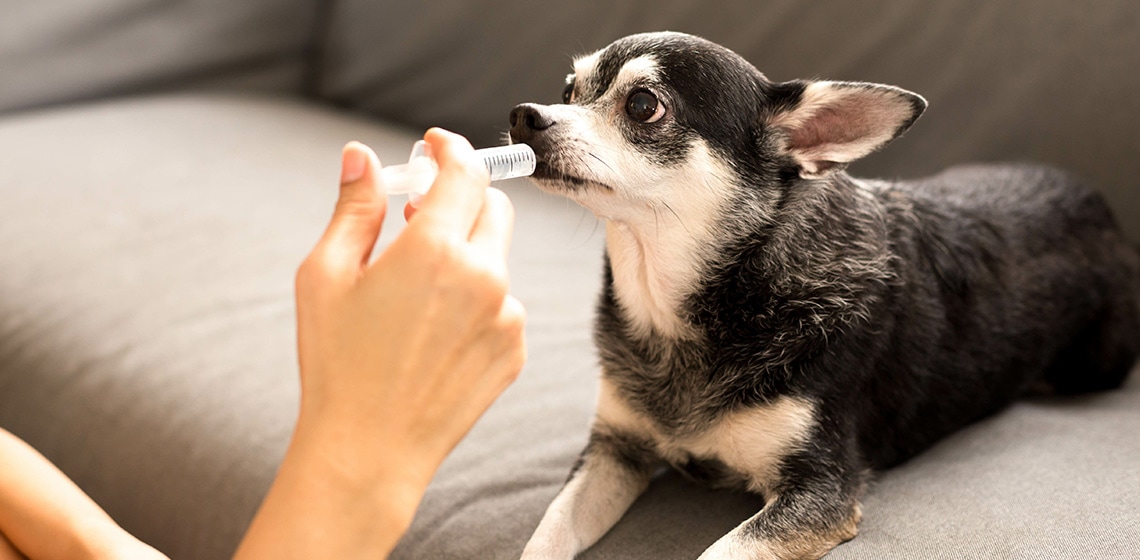If your canine companion has had an upset tummy recently, or if they’re at risk of bleeding from their gut, they might have been prescribed sucralfate by the veterinarian. But what is sucralfate for dogs? What is it used for? And what should you know before giving it to your dog?
What is sucralfate?
Sucralfate is a part of a group of medications called gastro protectants. As the name might suggest, it protects the lining of the gastrointestinal tract, from the mouth and esophagus, all the way to the rectum, allowing any areas of ulceration to heal. Its other trade names include ‘Antepsin’, ‘Carafate’, and ‘Sucrate’. It is available as a liquid and a tablet and is also used in human medicine. Although used regularly in dogs, sucralfate is not licensed for use in animals. This means that when veterinarians prescribe it for dogs, it is considered ‘off-label’. This doesn’t mean that it is unsafe, however, it just means that the drug manufacturer has not gone through the lengthy process to apply for a license or that evidence is not yet extensive enough to be absolutely certain about potential adverse effects. In reality, many veterinarians prescribe sucralfate, and it is regularly used safely and effectively in dogs.
Sucralfate protects the lining of the gastrointestinal tract, from the mouth and esophagus, all the way to the rectum, allowing any areas of ulceration to heal.
What is sucralfate used for in dogs?
Sucralfate is used in any condition where ulceration or damage to the stomach or gut is anticipated. This includes dogs with severe vomiting and diarrhea, especially if it contains blood. However, it also includes dogs who have bleeding disorders, those who have overdosed on medications that could cause stomach ulcers, and those who have eaten or drank something caustic that could damage the lining of the gut. It can also be used after bowel or stomach surgery because it forms a layer over the healing tissue, reducing irritation and inflammation. Sucralfate can also be helpful in dogs with kidney failure, esophagitis, or acid reflux. If you’re wondering what to feed your dog when they have an upset stomach or another gut issue, you can find some advice here.
Sucralfate is used in any condition where ulceration or damage to the stomach or gut is anticipated.
Are there any side effects of trazodone?
Any medication or substance that is ingested by or injected into your dog has the potential to cause an allergic reaction or even anaphylaxis, but thankfully this is incredibly rare. Sucralfate is a very safe medication because it isn’t absorbed into your dog’s system from the intestine. However, it can occasionally cause constipation, vomiting, or diarrhea, and it may interfere with digestion (and therefore absorption of nutrients) if given excessively.
Sucralfate is a very safe medication because it isn’t absorbed into your dog’s system from the intestine.
Is sucralfate safe to give with other medications?
Because of the way it works, forming a protective barrier over the gut and stomach lining, sucralfate can reduce the absorption, and therefore the effectiveness, of any other medications. While there are some medications where the exact dose isn’t too important, it could destabilize the condition if your dog is on essential medicines for heart conditions, seizures, or other critical illnesses. Therefore, it’s vital to make sure that your veterinarian is aware of your furry friend’s medical history, including any medications or supplements you give at home.
While there are some medications where the exact dose isn’t too important, it could destabilize the condition if your dog is on essential medicines for heart conditions, seizures, or other critical illnesses.
Are there any dogs who shouldn’t have sucralfate?
Early evidence suggests that sucralfate could affect your dog’s blood sugar, perhaps by reducing absorption. Therefore, if your dog is diabetic, sucralfate might not be the best choice of medication. Otherwise, unless your dog is allergic or has had a previous reaction to sucralfate, it should be safe to give.
If your dog is diabetic, sucralfate might not be the best choice of medication.
Summary
If your veterinarian prescribes sucralfate, try not to worry. Although it isn’t licensed for use in dogs, it is regularly used safely and effectively. As long as you make your veterinarian aware of your dog’s medical history, sucralfate could prevent the potentially severe consequences of stomach or gut ulceration.
Talk to your veterinarian to determine if sucralfate is good for your dog.
FAQ
If your dog is at risk of gastrointestinal bleeding or ulceration, your veterinarian might prescribe sucralfate. This includes dogs with severe vomiting or diarrhea, bleeding disorders, kidney failure, esophagitis, or acid reflux. It also includes dogs who have eaten something they shouldn’t have, like caustic substances, human medications, or foreign material. You can find out more about what to do if your dog is vomiting by clicking this link.
Because sucralfate forms a physical barrier over any gut ulceration or inflammation, it works very quickly. Depending on how far along the gut the area of ulceration is, the sucralfate could be working within ten minutes to an hour.
Sucralfate is a very safe medication with very few side effects. However, if your dog is on any other drugs, it might interfere with their absorption, leading to health complications. Therefore, it’s crucial to speak to your veterinarian to make sure sucralfate is the best choice for your dog.
Sucralfate is available as a tablet or a liquid. It should be given on an empty stomach, at least half an hour before food or any other medications. Ideally, it would be given directly into the mouth by tableting your dog or giving the liquid a syringe. If this is impossible, your vet might recommend adding a small amount of food to encourage them to eat it. However, since many medications can be affected by being given with or without food, you should discuss it with your veterinarian if you’re unsure of the best way to give your dog any treatment.

Dr. Hannah Godfrey MRCVS graduated from the Royal Veterinary College in 2011. Although she initially worked in mixed practice treating all species, she found a love for small animal work and has worked exclusively with dogs and cats since 2014. She lives in Wales with her partner, son, and two cats (named Poppy and Ashton Kutcher), and writes comedy fiction in her spare time.








